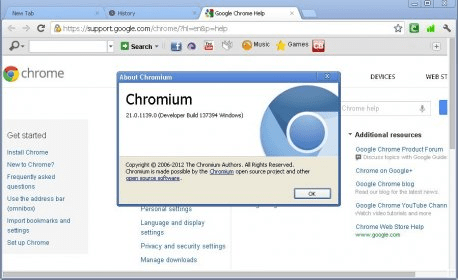


Their decision to open-source V8 led to one such effect: the NodeJS system was built on V8, which is now one of the most popular environments for building backends for web apps. They didn't have to become the biggest browser for this to be successful, they just needed the web as a whole to become more attractive. By becoming a major browser maker, they could help new technologies gain acceptance by implementing them themselves. This openness (paired with Google's deep pockets) helped Google become a heavyweight in shaping the future direction of the web. This openness helped the new browser gain rapid adoption with technology enthusiasts and later with the mainstream. The innovators in the space were open source, so Chromium also went open source. Note the mention of Firefox and WebKit but not Internet Explorer, which was perceived as holding the web back.
Programming with chromium source code code#
We believe that open source works not only because it allows people to join us and improve our products, but also (and more importantly) because it means other projects are able to use the code we've developed. The more people do online, the more they can use our services. With a richer set of APIs we can build more interesting apps allowing people to do more online. To be clear, improving the web in this way also has some clear benefits for us as a company. Open source projects like Firefox and WebKit have led the way in defining the next generation of web technologies and standards, and we felt the best way we could help was to follow suit, and be as open as we could. Primarily it's because one of the fundamental goals of the Chromium project is to help drive the web forward. In their release announcement, the Chromium team explains their reason for publishing the code under a permissive BSD license. V8 might have been such a thing, but Google didn't need a better engine for themselves, they needed a better web for themselves: a medium to sell ads through. There wasn't any proprietary magic in Chromium that was worth keeping secret. The name “Chrome” is a reference to the fairly minimal user interface Google added around WebKit and V8.

(V8 wasn't completely written from scratch, but some parts were based on Strongtalk which also formed the basis of the OpenJDK/HotSpot Java Virtual Machine). Google created Chromium by taking the open-source WebKit and combining it with their more advanced V8 JavaScript engine, which made client-side web applications more feasible. After all, Apple was not in the business of making browser engines but in the business of selling devices that need a pre-installed browser. There was some collaboration between WebKit and KHTML but at some point Apple found it easier to completely open-source their code: working together is easier. WebKit was actually a fork of the KDE project's KHTML browser engine. Safari was based on the WebKit rendering engine, which had recently been open-sourced.

The Firefox code was based on the Netscape browser which had lost the first browser war – but was then open-sourced in an experiment: a bet that working together was better than working against each other. Firefox was an open source browser that had about 25% market share.Google depends on the web to sell ads, but IE wasn't a very attractive portal to the web. Internet Explorer had won the first browser war (late 90s) and had about 70% market share, but was somewhat stagnant since then.Building browser engines is expensive! Instead, they looked at the market situation at the time (2008): When Google created Chrome/Chromium, they didn't start from scratch. Google benefits from the reach and impact that open source enables.Chromium is derived from a tradition of open source components.Browsers don't have any secrets that must be protected.Instead, I want to point out three aspects:
Programming with chromium source code software#
Companies produce open source software for a variety of reasons, including marketing and developer relations.


 0 kommentar(er)
0 kommentar(er)
